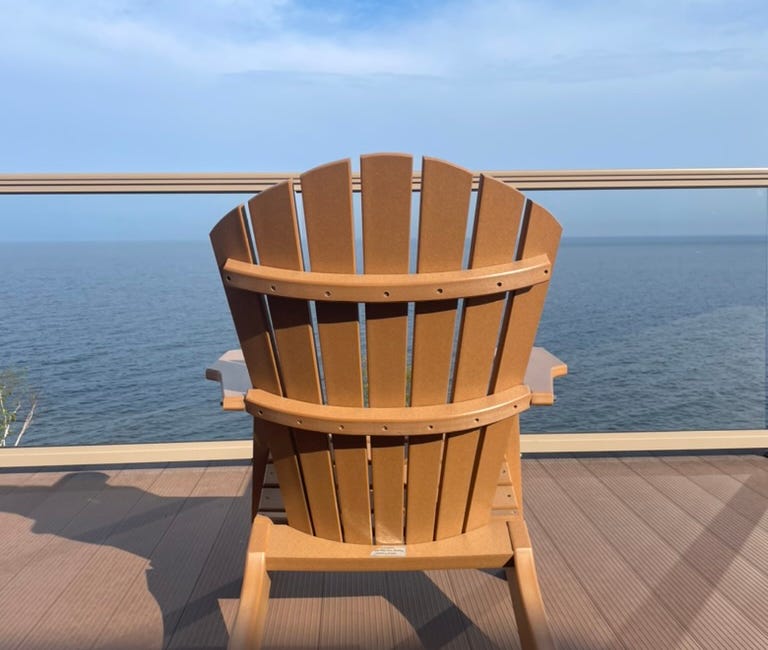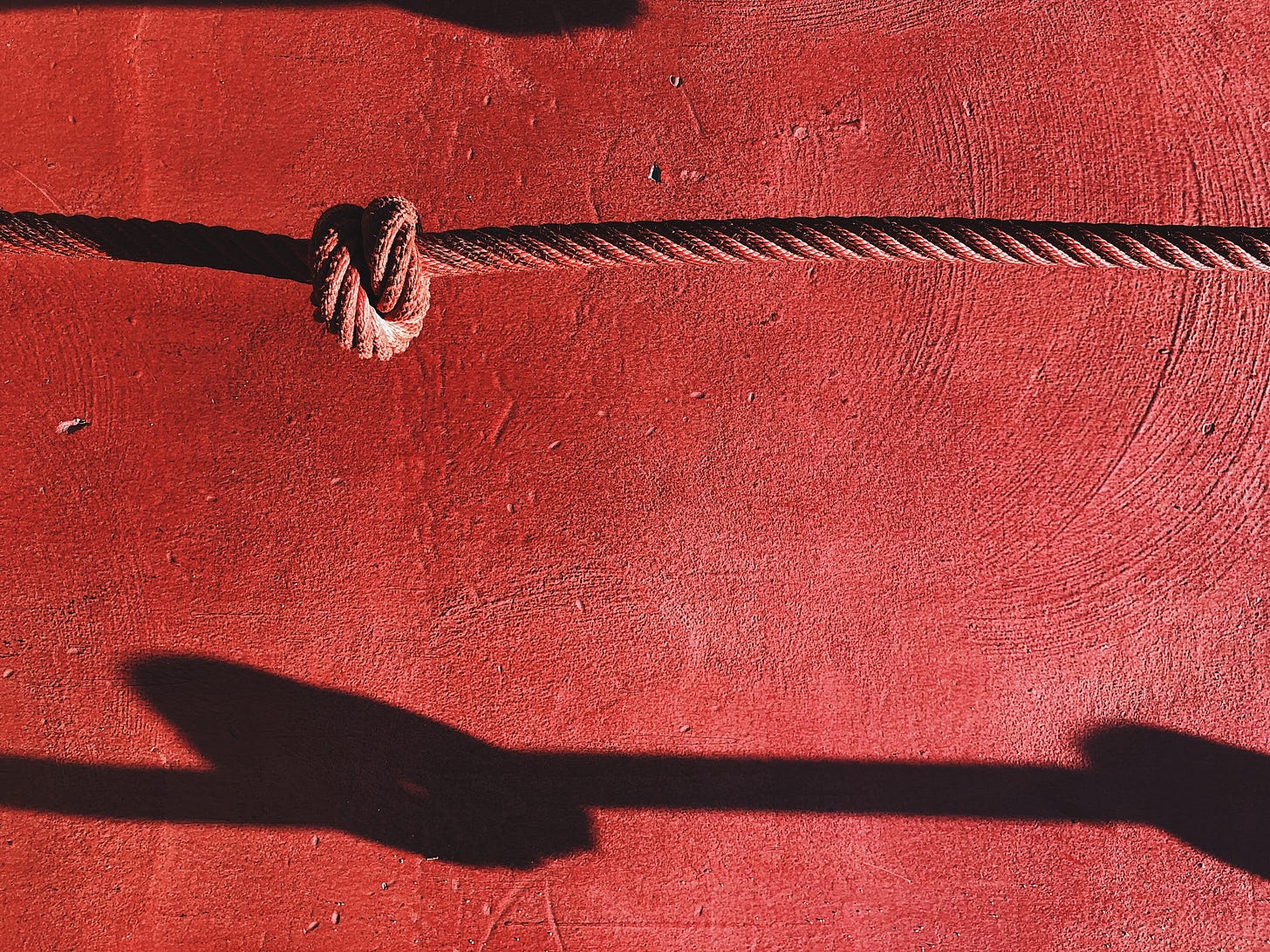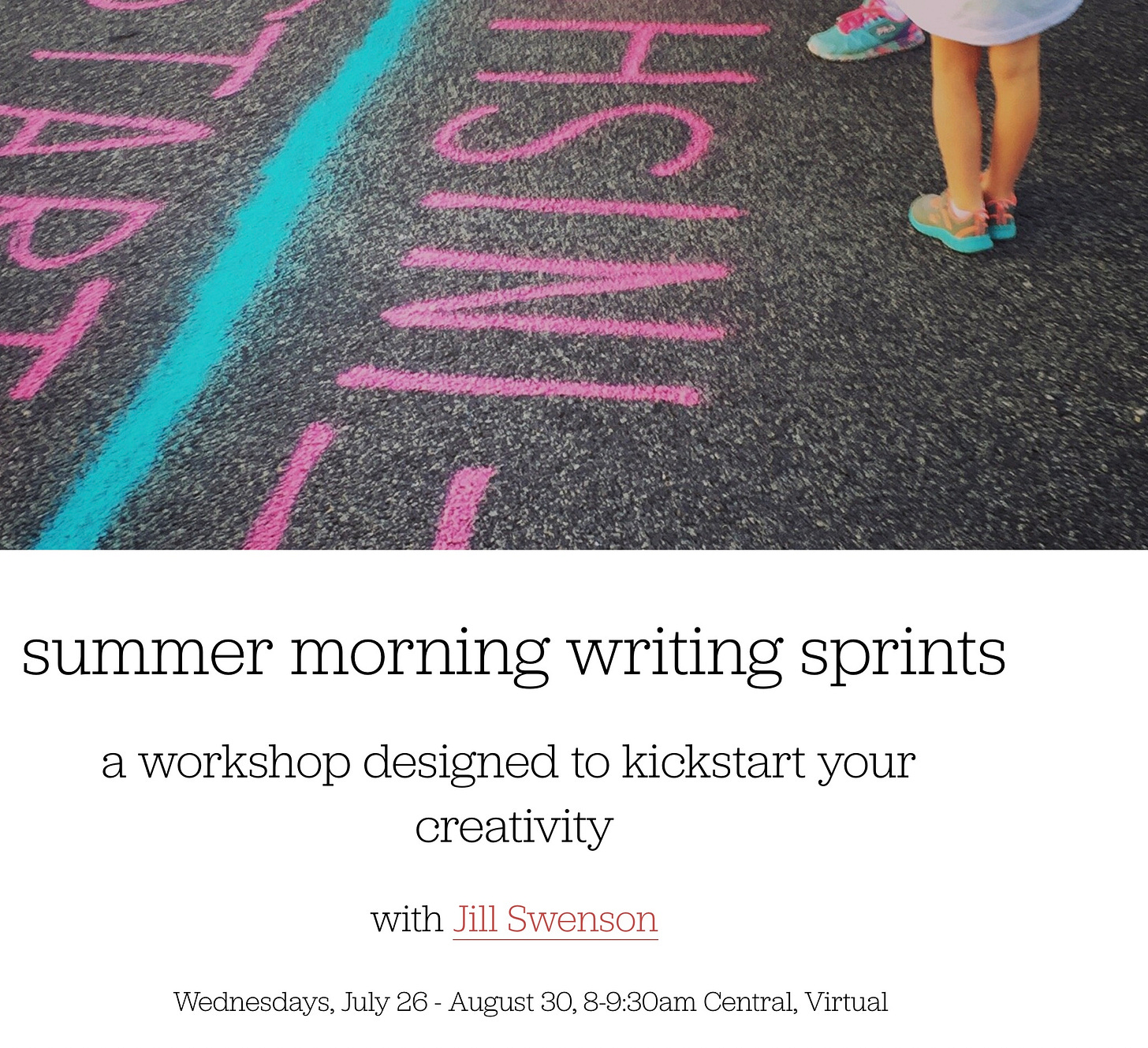Dear Stuck: What Are We So Afraid Of?
On creative paralysis and the strange and eternal heartbreak of finishing work + the radical freedom of ordinariness + the one thing that will close the gap between the work we make & the work we love
Hello, friends. Happy Juneteenth! The University of Minnesota is closed today in order to celebrate abolition, Black freedom, Black joy, Black history, and Black futures. I hope you are celebrating or honoring this day in some way that feels right to you. I am at my tiny historic cabin in the BWCA, writing, and thinking about the words of Toni Morrison, who said, in her 1993 Nobel Lecture:
Word-work is sublime … because it is generative; it makes meaning that secures our difference, our human difference—the way in which we are like no other life.
We die. That may be the meaning of life. But we do language. That may be the measure of our lives.
And in service of “doing language,” as we do in Writing in the Dark, I have announcements—including that this post is the very first installment of a new feature, Lit Salon (today’s edition explores the painful and sometimes terrorizing experience of creative paralysis and is free for all, so I hope you enjoy!).
But first, the rest of the news. Starting today and through the summer, I’m rolling out some new features for Writing in the Dark subscribers. Free offerings will remain free, including craft essays like last week’s post on what solitude taught me while revising my novel:
Kazuo Ishiguro Wrote REMAINS OF THE DAY in Four Weeks & Now I Understand How He Did It
Here, friends, is the post I promised I would share with you detailing my recent solo writing week on the North Shore of Lake Superior. If you are in the middle of a book project and need more traction, or if you are at all struggling to engage or re-engage with your creative writing practice in general, this post is for you.
Other free content includes occasional personal essays, interviews, and the weekly mini craft essays with Wednesday’s structured writing prompts. None of that will change. But a few paid offerings be added. That’s because when I launched this newsletter in December, I didn’t realize how interactive it could be. So I’m refining and clarifying the newsletter’s content and schedule in a way that feels even more aligned with Toni Morrison’s words, which inspire the mission of this project. If you want to know more about Writing in the Dark, including the backstory of both the workshop and this newsletter, and the planned offerings for the next year, you can find more on the newly revised About page.
Meanwhile, the new features for paid subscribers are:
Lit Salon: This feature—like a Q & A or “office hours”—is where I write in response to your questions about writing, the writing life, and creativity in general. I’ll answer what I can, while also acknowledging the inevitable ambiguity that can be part of any creative life (or just a part of any life, for that matter). Lit Salon posts will arrive on Monday and will be paywalled starting in July, but free through the remainder of June, to give everyone a chance to what it’s like!
Seasonal Writing Intensives: These writing intensives will provide something akin to the curriculum of a full-fledged writing class delivered in a series of posts on a predetermined schedule. For example, in April of 2022, for example, I hosted a 30-Day Creativity Challenge that brought one post a day for 30 days, each with an essay and prompt geared toward amplifying our creative practices. I got lots of enthusiastic praise for the Creativity Challenge. One writer even said, “The Creativity Challenge fundamentally and permanently changed the way I think about writing.”
Other intensives in the works for 2023 include Essay in 12 Steps starting in August and Story in 12 Steps in December.
Like April’s 30-Day Creativity Challenge, The Essay in 12 Steps will be structured and designed to help you generate inventive, interesting, and very alive new work. Unlike the Creativity Challenge, the Essay Challenge is geared toward helping you build and complete a new work from the ground up, including some revision. Each week’s prompt during the challenge will guide you incrementally toward that end. Hopefully we’ll really roll our sleeves up together in the chat as well, as we wrestle and wrangle our way through the thicket of creative discovery. I am most interested in essays that are lyric and literary, so while the Essay Challenge can be adapted to various essay forms and will provide many adaptive options for building your work, I’ll be specifically exploring literary and lyric concepts in the structured prompts and the accompanying craft essays during the challenge. If your essay wants to be a more traditional narrative essay, you can use the prompts will help make that narrative more vivid, alive, strange, and impactful. I can’t wait to start writing with you this way starting in August! If you are ready to make some beautiful new work, be sure to subscribe.
And if you know someone who would love a 12-week essay class taught on Substack, this would be a wonderful time to give a gift subscription.
Lit Salon
What Are We So Afraid Of?
Dear Jeannine,
I’m bound up and paralyzed when it comes to my creative life. I know you can’t solve it for me, but if you have any insight, I’d be grateful. The fact is, I know I’m a creative person. I always have been. I come from a very creative family. I played two instruments in high school and worked in art galleries for a long when I was younger. I draw and paint and build things with wood. I even bake. But when it comes to taking the next step with my creative practice—finishing essays or stories and submitting them for publication—I freeze. I just can’t seem to make myself do it. I know you’ll probably say something about fear, like fear of rejection, and I’m sure you’ll be right. But, honestly, I do know that participating in the creative community involves some rejection. I watched that up close in the galleries. So I get it, and although rejection is a bummer, it’s not the end of the world. In other words, think I could handle the rejection. So, what on earth could I be so afraid of?
Signed,
Stuck
Dear Stuck,
I’m so glad you wrote. Because I’ve been thinking about your question for a long time, actually. Since long before I read your note. That’s because someone quite close to me is in this exact same predicament—a kind of creative paralysis that keeps him from the full expression of his creative aspirations, which, meanwhile, gnaw at him and cause him considerable misery. Not because he’s ignoring his creative desires, but, rather, because he’s keenly aware of them but unable to move forward toward their manifestation.
Why do we do this—why do we deny our creative impulses, even when we know it diminishes the quality and even the meaning of our lives? I think often of what Mary Oliver said about this phenomenon:
The most regretful people on earth are those who felt the call to creative work, who felt their own creative power restive and uprising, and gave to it neither power nor time.
But I am not trying to make you feel worse about all this!
To the contrary, I want you to feel not only a little better, but also more empowered about stepping away from this paralysis and into the wild unknown of creative discovery and growth that is your birthright. I want you to be so close up to the world through your words that the sheer enormity of its beauty and despair raises the hairs on your arms and makes you certain you’ll never again lose hold, not completely, anyway, of your creative self again.
And although I can’t know for certain what’s getting in the way of your creative practice, I can share what helped me get out of my own way about ten years ago, when I first started on the path away from contract writing and toward literary writing—stories and creative essays and a memoir and now my novel, all of which represent the kind of artistic writing I wanted to be doing all along, but wasn’t.
What got me there?
Well, the first jolt was Mary Ann, a woman with stage 4 breast cancer who I met in 2013 and who catalyzed me to start taking my creative writing more seriously. Mary Ann simply moved me, and I’ve spoken and written about that experience a number of times, including in this Hippocampus interview. But there was something else, something far more subtle, that imbued me with the clarity and courage I needed to start making my own art. And it happened at AWP in Minneapolis in 2015.
It was the first AWP I had ever attended, and I had not yet submitted or published any literary work. In fact, I only registered for and attended AWP that year because I was about to start my MFA program at Vermont College of Arts later that summer, and I live in Minneapolis, so I didn’t need to deal with air travel or hotels or most of the other logistics that make AWP cost prohibitive and overwhelming.
What I discovered that April—I was forty-six years old that year, by the way—was that I was ordinary, would probably always be ordinary, and that it was okay to be ordinary. That’s it. That was my big epiphany.
And it was one of the most creatively freeing moments of my life. Because it turned out that one of the strangleholds on my creative force until then was the fear—no, terror—that if I made literary work, it wouldn’t be brilliant. It wouldn’t be extraordinary. It wouldn’t be important. It wouldn’t be acclaimed or significant. In other words, it wouldn’t matter. But wandering the Minneapolis Convention Center in the company of 15,000 other writers helped me realize, with sudden certainty, that the vast majority of successful working writers are just like me, making a perfectly ordinary life of words.
Perfectly ordinary lives that are, simultaneously, extraordinary, because that’s the paradox: to claim the right to be creative, to make work and send it out (whether to be rejected or accepted, both are scary), and to make visible to the whole entire world your “call to creative work,” which is usually kept hidden in a very tender and vulnerable spot deep in the recesses of your heart, is revolutionary and, therefore, extraordinary, no matter what that work ultimately becomes or does not become in terms of its so-called importance.
Put another way, I discovered, while drifting dazed, confused, and inspired through that big conference, that an “ordinary” writing life was anything but, and that even though most of the these midlist authors and MFA students in that convention center would likely never achieve the acclaim of the keynote speaker and the slender swath of more famous panelists, they were doing something just as urgent, if not more so, which was to show up for their own “creative power restive and uprising,” and give it “power and time.” That, I decided then and there, was the beginning and end of it. Whatever else happens—how good our work is, how important it is, how impactful and recognized it becomes—is mostly out of our hands.
Oh, sure, we have some control. The more seriously and regularly we show up for our creative practice, the better the art will become. We will gradually close the gap between the art we love and the art we make. When I coach writers who struggle to finish things, one of the first things I tell them is that it hurts to finish work—sometimes a lot. Because when we finish, we’re acknowledging, at least to some extent, that this is the very best work we can make at this time. It’s the top of our game. And that requires us to also acknowledge the gap between what we’d imagined when we began, and the reality of what we were actually able to produce. It’s mournful, really, to finish something. It’s an act of surrender to our own limitations. When we get to the metaphorical “the end” at the bottom of the page, we’re forced to accept everything that this particular essay, story, poem, or book will never be. If that doesn’t hurt a little, well, then I have to wonder if the thing was art in the first place? Because, generally speaking, art leaves an ache. That’s just the way it is.
And as for the gap between art we love and art we are capable of making, Ira Glass speaks about closing this gap so beautifully, about how long it takes before our work “gets that special thing” that we want it to have. And his answer is about doing a lot of work, creating a huge volume of work, until the work we make is as good as our ambitions. I love and believe what Ira Glass says on this.
And I also think that it only partially matters that our work improves. Because what really changes, as we give time and attention to our creative power, is us.
We change.
We become a far realer and more alive version of ourselves as we heal the division in our consciousness that has kept us from our creative work in the first place. We become fully human as we make peace with the inevitable disappointment of the creative process, while celebrating its inherent joys. We become stronger as we endure that disappointment, along with the pain of rejection, criticism, and dismissal, all of which are real. But we also become braver, softer, and more resilient as we continue making work, engaging with the creative unknown, taking risks, and exposing the our tenderest bellies.
So, my hope for you, “Stuck,” is that ultimately you might be able to make peace not only with the inevitably of rejection—which it sounds as if you have already done—but also with the near certainty of falling short of your own aspirations, and of never making anything that will “matter” in the long arc of history. Such peace will free you not only to begin, but also, ultimately, to make more inventive and exciting work. Work that is strange and feral and full of possibility. Work that, ironically, will have a better chance of standing out as extraordinary than it would without this inward calm acceptance of ordinariness.
Love,
Jeannine
One More Thing! An Upcoming Class At Elephant Rock
Summer Morning Writing Sprints to Kickstart Your Creativity
Short bursts of energy spent early in the day on creating something unexpected best describes this workshop intended to evoke something new and fresh in your writing. The sprints are writing exercises with constraints done during the live session.
Tuition: $449
Teacher: Jill Swenson is a developmental editor and literary representative in Wisconsin who earned her M.A. and Ph.D. from The University of Chicago and taught journalism at the University of Georgia-Athens and Ithaca College. She has taught writing workshops at The Loft Literary Center, Buffalo Street Books in Ithaca, and the Grand Marais Art Colony. In July 2021 she completed a writing residency sponsored by the St. Croix Watershed Research Station (Science Museum of Minnesota) and was the featured writer-in-residence for the Red Shoes Lake of the Woods Writing Retreat in September 2021. She has recently completed a braided nonfiction narrative manuscript, Dispossessed, exploring on Lake of the Woods in northern Minnesota the connections between her maternal relations and the Kakaygeesick family over seven generations and why we can never dispossess ourselves of the past, no matter how shameful or tragic or distant.
Get more info or sign up here!
Finally, if you want to participate in Lit Salon, just leave a comment below and I’ll consider your question in a future post. Thank you so much for Writing in the Dark with me!









Wonderful Jeannine. So deeply true and helpful. 🙏
Absolutely loved this, I sent it to an artist friend whom I recognised in your words.